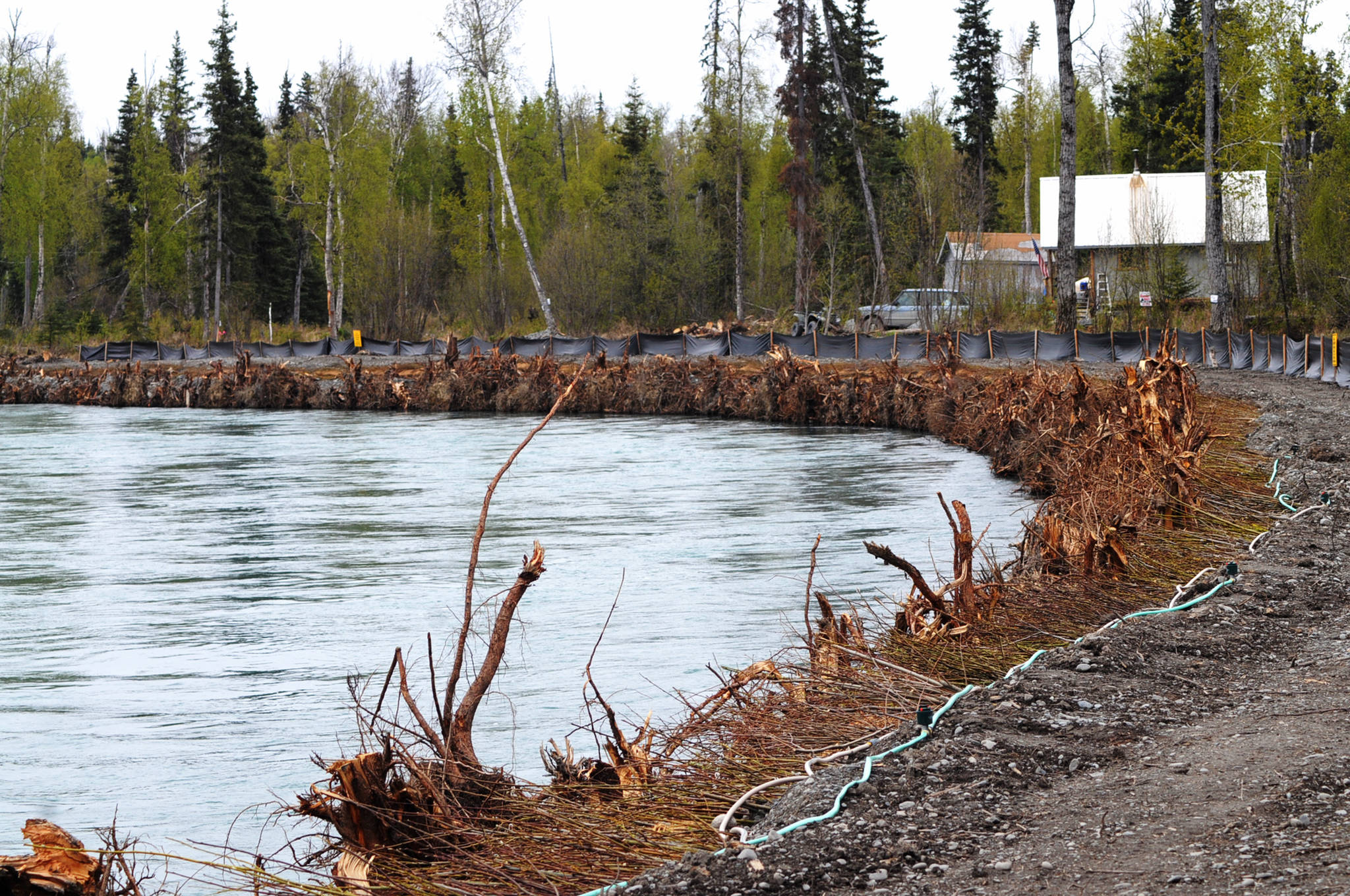A state hearing officer has decided that the two men accused of illegally dumping gravel in the Kenai River this summer have to remove the gravel and pay a combined $62,000 in fines.
The Kenai Peninsula Borough filed enforcement orders against two men, property owner Steve Flick and Jason Foster of North Star Paving, for violating the terms of construction permits for a project on Dow Island in the Kenai River. In early June, Flick had asked Foster’s company to place some gravel against the bank to repair damage to a rootwad revetment project along the bank in response to some damage that caused parts of the revetment to come loose.
The permits Flick had for the revetment project, completed in April, included the use of some gravel, but the riprap the North Star Paving crew ended up using wasn’t included in the permit. The crew drove equipment through a slough with flowing water to reach the island, which is also against the law. The borough filed the enforcement orders against the two men and two of the property owners in August.
The borough held a hearing on the violations Dec. 6 administered by state hearing officer Holly Wells. In her decision, received by the borough Dec. 18, Wells dismissed the charges against the property owners after borough officials said they didn’t want to levy fines against them and only included the charges so they would be included in the proceedings.
“While I understand and agree with the Borough’s desire to ensure the low owners were informed regarding these proceedings, the filing of enforcement orders against any individual triggers certain obligations by the hearing officer that cannot simply be forfeited because the parties are in agreement,” she wrote. “… Essentially, the Borough’s recommendation in its written report serves as written notice to the hearing officer and the other parties that the enforcement orders issued to the lot owners were issued in error.”
She found in the borough’s favor against Flick and Foster because the use of riprap, which wasn’t covered by the permits Flick had, and because they didn’t get permits from the borough for the operations.
Flick’s attorneys said during the hearing he believed the permits covered maintenance and that he thought the repair to the project in June was maintenance. The borough disagreed, saying riprap would never have been acceptable as maintenance. Wells agreed with the borough, saying the permits limit any construction to the project drawings.
“Mr. Flick’s interpretation would essentially render the permitting process meaningless once a project was substantially complete, allowing the dumping of any material to ‘maintain’ a structure regardless of the harm such material would cause the river or its inhabitants,” she wrote. “This interpretation is not only expressly contradicted by the permits themselves, it also undermines the purpose of both the Borough’s floodplain management efforts and its laws protecting anadromous streams habitat.”
During the hearing, Flick said he wanted to take responsibility for North Star Paving’s violations because he subcontracted Foster to complete the repair. However, because the borough did not receive a formal response to the complaint, Wells said her authority to dismiss the complaint against North Star Paving was limited.
Wells required both men to remove the gravel and repair the damage by June 1, 2018, and file plans to do so with the Kenai Peninsula Borough’s Donald E. Gilman River Center by March 1, 2018. She also levied two fines of $18,000, one for each violation, against both men, with a possibility of $10,000 suspended for Flick. The extra $10,000 will be written off when the borough determines Flick has completed the removal of the gravel and repair, she wrote. The suspension option was not extended to Foster in the decision.
The fine reduction was to encourage Flick to complete the removal quickly and in compliance, she wrote. He initially asked her to consider that the situation was an emergency when she was considering the fine. The borough disagreed that the situation was an emergency and asserted that there is a process for emergency permitting anyway, which can be completed quickly.
“… I am hesitant to reduce a fine due to a perceived emergency rather than actual emergency, especially where there is a procedure for receiving verbal approval from the (Kenai River Center) in an emergency and the communication between the Borough and Mr. Flick throughout the record clearly demonstrates the (Kenai River Center’s) responsiveness and availability,” she wrote.
Foster said he plans to appeal the decision, which can be filed in the Superior Court within 30 days, and that Flick planned to cover their fines.
Flick said during the initial hearing that he intended to take responsibility for North Star Paving’s violations but his attorneys said they were only representing him at the hearing. Borough deputy attorney Holly Montague said at the hearing the borough didn’t want to drop the enforcement order against North Star Paving.
Misdemeanor charges were filed simultaneously in state court against the two men, but Kenai District Court Judge Sharon Ilsley said during a Nov. 2 hearing that the court would postpone a hearing to give the borough time to complete its own process.
The borough doesn’t generally permit the use of riprap in riparian habitat projects because studies indicate it doesn’t provide sufficient salmon habitat and can cause issues in floodplain management. The borough has enforcement authority within 50 feet of anadromous streams through a borough-wide ordinance protecting riparian habitat as well as enforcement authority within floodplain zones.
Reach Elizabeth Earl at elizabeth.earl@peninsulaclarion.com.

